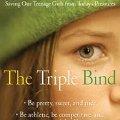Young girls today are expected to excel academically, be athletic and look like models. That is putting a growing number of teenage girls at risk for aggression, eating disorders, depression and even suicide, according to psychologist Stephen Hinshaw. He examines the problem and suggests some solutions in a new book called Triple Bind .
The title of the book is a play on the phrase "double bind." The term was coined by 1950s social researchers to describe a situation in which a person is given conflicting messages, so that if they obey one, they end up disobeying the other. University of California psychologist Stephen Hinshaw says girls today are faced with unprecedented - and conflicting - social expectations, and they are unable to meet them all.
"First, girls are still raised to be our caregivers and nurturers, taking care of others in the next generation, second, we've got to raise them now to be ultra competitive, because they are the top of their class, getting athletic scholarships as well as unprecedented academic success. So that's the double bind. And the triple bind comes in with the pressure to be unrelentingly perfect." The price of perfection Hinshaw says, in many ways, today is the best time in history to be a teenage girl, but it's also the worst. All sorts of pressures, he explains, make young girls more vulnerable to serious mental health problems.
"One girl in four in the United States today by the age of 19 will have experienced at least one major depression, made a suicide attempt, engaged in binge eating or other signs of eating disorders, or have cut or harmed herself - burning, gouging, other forms of self mutilating behavior." He expresses concern that those pressures take away from the real task of adolescence, which is forming a meaningful identity.
"Too many of the girls that we spoke with for this book said things like, 'We don't speak up in class.' Why wouldn't you speak up in the class? You're doing so well academically. 'Well, we get graded down if we don't have the right answer the first time. This is chilling, because if you're going to learn, if you're going to figure out who you want to be, you got to take chances. If you want to self-discover, you sometimes don't get the right answer. [You have to] try new things out." The pressure to be perfect may also explain why many girls are increasingly becoming more physically aggressive.
"With the great opportunities girls now have for athletics, girls are learning to use their bodies physically from an early age, which is great in many respects, but girl-on-girl violence - fighting over boys, fighting over status, which used to be more of what we call relational aggression, ruining a reputation, using words very sharply, et cetera - but has turned in the last decade or so into high rates of physical aggression in girls. So it's not only that girls are responding to the pressure by taking it out on themselves, but they are taking it out on others." Warning signs for parents In his book, Hinshaw shares stories of teen girls who suffer from the triple bind. He also identifies the early signs that show the pressures are too great, so parents can recognize what their daughters might be silently struggling with and step in to help.
"It takes some real thinking, and sometimes probing, but without being intrusive. Are you seeing cut marks, burn marks, maybe hidden by long-sleeve sweatshirts? That's a real sign of concern. Self-mutilation, self-harmful behavior is a way of expressing a deep inner pain when there are no words for it.
"Is it not just occasional sad mood and ups and downs of life, but serious loss of interest, serious loss of pleasure, major change in peer groups and friends and motivation? That could be a real sign of depression. Obsession with looks, obsession with weight. These are the signs that kids are crying out, 'Mom and Dad, you've got to take a look.'" Family can help girls cope Parents, he says, play a crucial role in countering the triple bind and preventing pressures from negatively affecting their daughters. "I think we all, as adults, can help our daughters think critically more. Mealtime discussions [are important]. Families who have dinners together several times a week or more, those are the kids who are protected against drug abuse, depression. One of the subjects of discussion can be: What did you see in the media? Was that an advertisement or a news story? Do all girls, even young girls, have to look like super models?" Parents, he adds, can also help their youngsters develop a wider perspective on life by encouraging them to understand and accept that they do not have to excel at everything, all the time.
"You can try out different sports, different ideas. It's okay to have downtime and not work every minute of every day on building your resume up. Maybe the most important way to counter the triple bind is to promote a wider sense of dedication, purpose and community service, getting out of themselves and linking with a wider world." Psychologist Stephen Hinshaw says, with their parents' help and guidance, young girls can make the best of the opportunities they have today, while learning how to lead a healthier, more realistic and balanced life.

